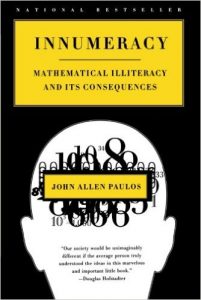 At 70 years old, John Allen Paulos, with his unkempt, curly hair and toothy smile, looks every bit like the public’s image of a mathematician, but he would disdain this as an intimidating stereotype, one of the many public misconceptions that serves to keep ordinary people away from the study of mathematics. He wrote Innumeracy: Mathematical Illiteracy and its Consequences in 1988, but his polemic against our society’s widespread discomfort with basic mathematical concepts remains depressingly relevant.
At 70 years old, John Allen Paulos, with his unkempt, curly hair and toothy smile, looks every bit like the public’s image of a mathematician, but he would disdain this as an intimidating stereotype, one of the many public misconceptions that serves to keep ordinary people away from the study of mathematics. He wrote Innumeracy: Mathematical Illiteracy and its Consequences in 1988, but his polemic against our society’s widespread discomfort with basic mathematical concepts remains depressingly relevant.
What is the evidence of our innumeracy? You might begin by looking at the popularity of horoscopes (still found in many major newspapers), Tarot cards, psychics, lotteries and gambling. Now consider that these widely enjoyed pastimes exist in an age that has landed probes on moving comets, developed unmanned drones capable of delivering targeted missile strikes around the globe, and is on the cusp of delivering credible virtual reality technology. Almost every citizen carries with them a tiny supercomputer in their hands, capable of the most advanced calculations, but absent an understanding of basic mathematical concepts, even our sophisticated means of computation are of no use to us. The consequences are visible everywhere, ranging from the benign to the devastating: from our eagerness to throw away money on obvious scams to how a single traumatic event – such as a plane crash or terrorist attack – can alter our way of life, despite the vanishingly small likelihood of a similar fate befalling us. Innumeracy was written during a panic about AIDS, and so one small section takes us through the studies to calculate the odds of contracting AIDS through heterosexual sex. The math is basic probability, but the conclusion flies in the face of the public’s terror: “It’s estimated that the chance of contracting AIDS in a single unprotected heterosexual episode from a partner known to have the disease is about one in five hundred.” It isn’t just the general public that suffers from innumeracy; Paulos cites a study out of the University of Washington that found most doctors’ risk assessment of various medications, surgeries and treatment methods were wrong, and often “by several orders of magnitude.” After having pointed out the consequences, Paulos targets the various sources of the problem, from a general fear of mathematics to a celebration of ignorance (“I’m not a numbers person”), before walking us through some of the basic concepts most often misunderstood or misapplied by the innumerate.
It is his contention throughout the book that our struggles are not insurmountable, not the result of an unescapable ignorance, but from our society’s attitude towards mathematical thinking, and the educational policies that spring from it. He writes, “our mathematical problems result more from insufficient exposure to mathematics as a way of thinking and a set of intricately connected higher-level skills than from an inability to compute.” This is gratifying, for it might lend us hope that our democracy will not forever be beholden to voters who cannot conceptualize the difference between a billion dollar debt and a trillion dollar one, or whose mathematical solecisms are every bit as debilitating to their function as citizens as illiteracy.